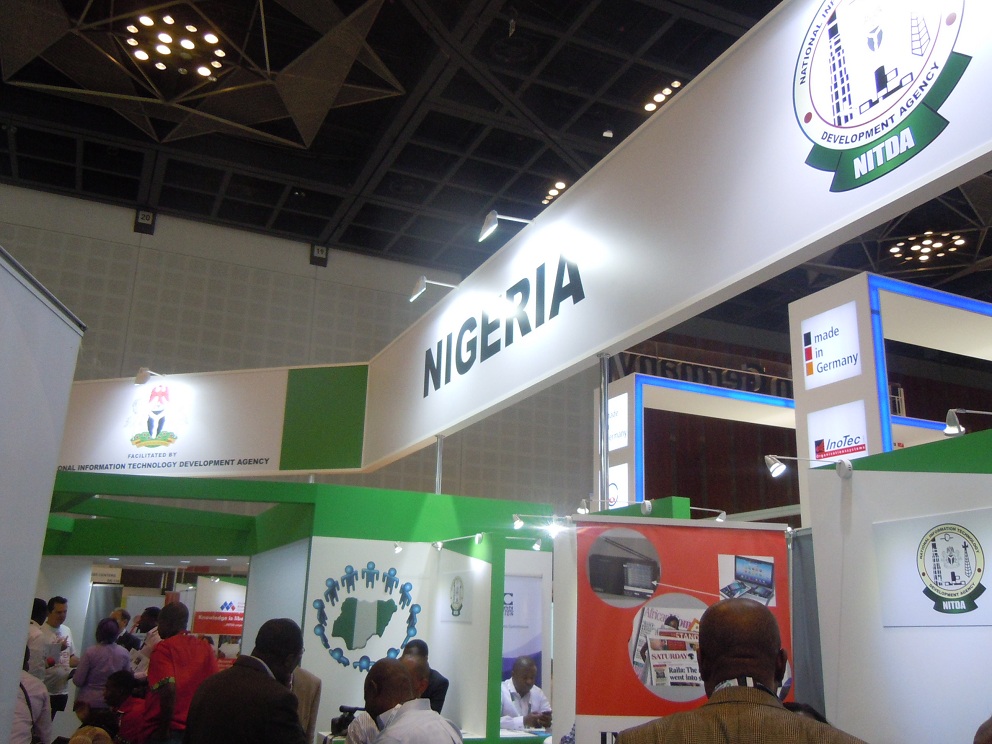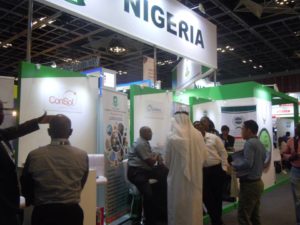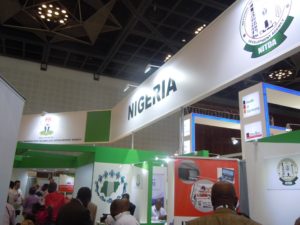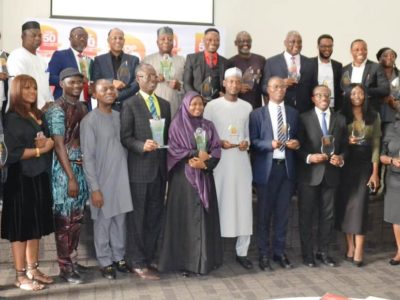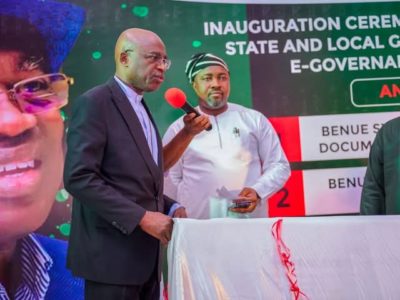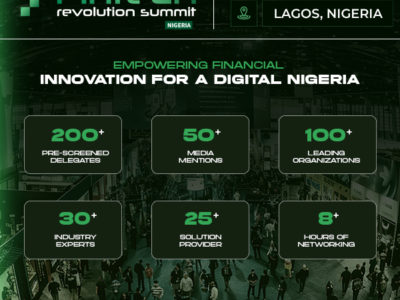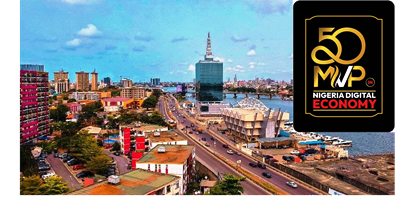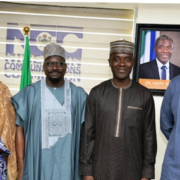Counting the benefits
MARTIN EKPEKE writes on the gains of Gitex 2014 for Nigeria.
The Gitex Technology Week, where Nigeria featured as the official country partner may have come and gone, but the Nigerian Pavilion successfully held at the five-day tradeshow in Dubai, United Arab Emirates affirmed that Nigeria is ready for business and investors will have a market to explore.
Promoted by the National Information Technology Development Agency (NITDA) and Pinnacle Consulting International LCC in partnership with Knowhow Media International publishers of IT Edge News.Com, the 20 exhibitors and about 200 delegates from Nigeria that graced the event are still salivating over the networking opportunities and the business prospects the event brought them.
The status of the Official Country Partner to Gitex saw many things going in favour of Nigeria. For the record, the Nigeria ICT Investment Forum held inside the World Trade Centre is the first time the country had such a well-attended international investment event.
From known local companies to relatively unknown ones, Nigeria showed the world the kind of innovation that is thriving in the country. Targeted at promoting Nigerian companies, products and services to the world, participants said the Nigerian Pavilion at Gitex couldn’t have come at a better time, especially now that the Nigerian government is looking for means to foster its commitment to grow local IT companies and expose their products and services to international opportunities.
The Nigerian pavilion at this year’s GITEX with the theme: ‘Invest in Nigeria, Gateway to Africa’ helped to solidify different interests in the Nigeria IT terrain and provided robust synergy between government and private sector players. Local talents and solutions ranging from financial and educational solutions were on display. The forum provided a meeting point for local players to engage the government represented by the Director General of NITDA, Mr. Peter Jack and also for potential international investors as well as partners to explore ways of navigating the Nigeria’s IT sector.
Mr. Jack said he was encouraged and challenged with the level of participation from Nigerian companies having visited some of the exhibitors’ stands inside the Nigerian pavilion at the Dubai World Trade Centre. “NITDA is encouraged with Nigeria showing, in the last few days, we have received a lot of interests. Most of the missions of various countries are getting in touch with us,” he stated.
Jack believed the decision to select Gitex as an avenue to showcase investment opportunities in Nigeria, particularly in the ICT sector was a well articulated move. According to him, Gitex is normally well attended, stressing that this year’s Gitex recorded over 60 countries attending and 3,700 companies exhibiting. “Of most important to us, are the young innovators, some of whom are still undergraduates from Nigerian universities, who are showing the world what Nigerians are capable of doing,” he added.
Also speaking in the same vein, Dr. Vincent Olatunji, director of Research and Strategies at NITDA, who also doubled as the chairman, Local Organising Committee for Gitex 2014 said: “The exposure and business opportunities presented before Nigerians here today is great, the networking opportunities are great and the rewards for this year’s Gitex will be felt in no distance time by the exhibitors and all the delegates. Just like other countries from across the world that established their own pavilion, Gitex presented Nigeria a special opportunity to showcase its local content that has been highlighted severally as part of the government’s core mission for the IT sector.”
From Nigerian companies showing educational solutions to financial solutions, the interest from foreign investors can be smelt, heard and felt. For companies like Data Sciences, Gitex is an opportunity to leverage on the successes the company had recorded in providing educational solutions to the Nigeria education sector. Mike Adedowole, executive director, Technical Services said Data Sciences is presently marketing eMarker, a solution used for examining the responses of candidates such that their information and images are scanned, then send to the cloud for the examiners to examine through the eMarker.
“We are here to showcase eMarker, the beauty of eMarker is that the candidate’s identity are not known to the examiners (Markers) because they are not supposed to know the person they are marking their papers, or state where they are from,” he added.
Gitex offered Nigerian companies opportunity to seek relevance outside the shores of the country as Gitex has consistently maintained its position as the industry’s trend setting authority; it provides exhibitors direct business opportunities with decision makers from around the globe. No wonder, companies like Precise Financial Systems believes that the sectorisation of Gitex has enabled new companies to participate in identifying trends as well as giving visitors the opportunity to engage, learn and implement the advances in the industry. “Gitex has continually identified the hottest global IT trends and incubates these in the event either as new sectors or conference programmes,” said Mr. Yele Okeremi, the chief executive officer of Precise Financial Services Limited.
He revealed that PFS was in Gitex to see how they can develop frontiers, get strategic partnerships and of course to learn new thing. “Gitex is an opportunity to know what the rest of the world is thinking, the new trend, global best practices, what is new, what can be adapted and what can be adopted to our own environment in Nigeria.” This year Gitex shows should get Nigeria to ignite a new thinking within government and the private sector that Nigeria ought to and should be presented to the outside world as a place of vast and limitless opportunities for IT, added Okeremi.
The Nigeria Pavilion in Gitex brought together companies from the private and public sectors, several meetings were held, partnership deals were also sealed. “The prospect is great having seen the A-Level visitors trooping in and out of the Nigerian Pavilion. It is a good start, it can be improved on and it can only get better with more efforts and coordinated approach,” said Roland Omoresemi, CEO of Tezza Business Solutions, whose company also exhibited inside the Pavilion. He said this year’s Gitex was a good encouragement from the government; more of such encouragement is needed, especially for young entrepreneurs looking for an opportunity that Gitex presented.
What is Gitex?
Gitex is an acronym for the Gulf Information Technology Exhibition. Launched in 1981, Gitex is the ICT business gateway to the Middle East, Africa and South Asia Region. It is focused on providing exhibitors with high ROI through direct business opportunities with decision makers, Gitex has maintained its position as the industry’s trend setting authority. Organised by the Dubai World Trade Centre annually in Dubai, Gitex is the largest ICT event in the MEASA region, attracting over 3,728 companies exhibiting from 61 countries, and over 142, 000 trade visitors from 150 countries and 1,500 delegates from 21 countries. Gitex’s growth is synonymous with the evolution of Dubai as a global destination.
Why Nigeria is an investment destination
- Nigeria is a key part of the improving African scenario
- Estimated population of 170 million people makes Nigeria the 7th largest country in the World; and the largest in Africa.
- Nigeria’s GDP has grown at close to 7% over the past 5 years
- Nigeria is Africa’s largest economy after the recent re-basing exercise: Revised GDP for 2013 is now $509.9 billion, up from old estimates of $269.5 billion.
- Nigeria’s consumer class is growing, approximately 23 percent of the population in 2012
- Nigeria had 106 active infrastructure projects in 2012, total value close to $100 billion
- Nigeria is the preferred investment location in Africa, of all the African markets, investors believe Nigeria offers the best overall prospect for investment returns over the next 3 years1
- Nigeria Gateway to regional West African market (ECOWAS), makes up 60% of ECOWAS’ 300 million population, accounts for about 71 % of ECOWAS GDP
- $32 billion telecom investment, 129 million active SIM cards, 60 million Nigerians access the internet.
- Information and Communication services contributed 19% to the Services sector
- The ICT industry has a significant enabling effect on other sectors of the economy, contributing a combined 2.56 % of added value. This is apart from direct contributions of 10.44% to 2013 GDP.
- Her commercial capital, Lagos has one of the largest and most liquid market in Africa. Major global players such as Microsoft, Cisco, HP all have a strong presence in Lagos
- Nigeria has a vibrant technology market opened for business; a large army of energetic entrepreneurs with a number of successful IT startups helping to make Nigeria a major technology hub in Africa.
Areas of investment interest
As advised by those who should know, Nigeria needs to harness and consolidate the growth of the ICT sector, increase the integration of ICTs across all sectors in a manner that supports the diversification of the economy while achieving job and wealth creation. Some of the areas that are considered green that needs investment in the ICT sector include Digital Payments. A presentation made by Dr. Takang Armstrong, the chief executive officer of Alteq Limited at the Nigeria ICT Investment Forum shows that a significant proportion of payments in Nigeria are cash based, despite the government cashless policy.
Takang revealed that total payments are estimated at US$695billion per annum; but cash accounts for over 90% of transactions in terms of volume, and about 60% in total value. Other digital forms of payment are increasing in volume, however they currently make up only about 2% in value. There is still a huge market for e-payment that is untapped.
More people in Nigeria have a mobile phone than have a bank account, but the mobile money introduced by the Central Bank of Nigeria is currently mostly used to buy airtime. It has the potential to serve as a platform for drawing more people into formal financial service, as cash transactions are expensive, risky and promote insecurity in the financial system and the country.
E-commerce: the Nigeria E-commerce space is getting hotter with the availability of many electronic payment gateways and entry of international payment firms that are increasing access of consumers to online retailing. Driven by payment platforms like Jumia, Wakanow, Dealdey, Quickteller, Konga and the relatively new Openshopen, powered by CWG Plc, the online retail sector is experiencing steady growth. In 2012, the sector could only boast of 1000 orders per day with an average of $100 per basket and $35 million market size. It grows to 15000 orders per day with an average basket of $100 per basket and a market size of $550 million in 2014. Analysts have also predicted a potential market opportunity of 300,000 + orders per day and a market size of $10 billion in the next few years.
Broadband: the Nigerian government National Broadband Plan 2013-2018, is a pointer that Nigeria needs investment to enable internet penetration to the last mile. Though, several submarine cables have landed on the shores of Lagos, Nigeria commercial hub, taking the over 9 terabytes capacity to the hinterland remains a challenge. The Infrastructure is currently concentrated in urban areas, leaving most of the rural areas underserved and unconnected in most cases. So the government is seeking to implement a national broadband strategy and roadmap that will increase broadband penetration from 6% to 30% by 2018.
Nigeria wants a 3G/LTE Wireless Broadband Coverage to 80% of the population, fixed broadband to 16% of the population based on fibre by 2018, minimum download speeds of 1.5 Mbps and an open non-discriminatory access. Already, efforts are underway for Spectrum auctioning, licensing of regional Infrastructure Companies (Infracos) and Smart States initiative to reduce cost of infrastructure deployment, all in a bid to facilitate increased investments in ICT infrastructure.
Government’s strategic policy thrusts that will drive investments
- Connect Nigeria: speed up the building out of communications infrastructure so that all of Nigeria has access to good quality and affordable, high-speed telecom and internet services.
- Connect Nigerians: ensure that Nigerians have affordable and convenient access to devices and have the capacity to use them; so that all Nigerians can share in the benefits of ICTs.
- Local Content: lower the barriers to entry and increase the participation of Nigerian companies in the ICT sector; and stimulate job creation in the industry.
- ICT In Government:
- Increase the adoption of ICTs by government to achieve greater transparency, efficiency, and productivity in governance and citizen engagement
CWG Plc – A Nigerian success story
From $16,000 in 1992 to $80 million in 2009, Computer Warehouse Group (CWG) Plc highlighted the excellent returns on investment in doing business in Nigeria. In a presentation made by Mr. Phillip Obioha, the chief operating officer of CWG Plc at the Nigeria ICT Investment Forum, he told the CWG story as a pan African IT company that has risen from the cradle to become a listed company on the Nigeria Stock Exchange in 2013.
Obioha believes that having paid all the dues necessary for growth in the industry, CWG is well positioned to benefit from expected industry growth and significant untapped opportunities. He added that CWG’s success story should be attributed to its experienced and highly skilled management team, established industry leader with a strong track record, strong partnerships and affiliations and deep relationships with key customers in the Nigerian business terrain.
He said CWG is a unique player in the Nigerian IT industry, while rolling out some of the achievements, products and services in 2013. He breaks them down in the following orders: became Plc in preparation for Listing, adopted IFRS standard, beefed up back end (BI,CRM, Finance, Service Mgt), restructure DCC to VNO model to mitigate losses, roll out to the other MTN OPCOs with Microfinance App in the cloud, provided Software and IP for Diamond Yello Account with target of 55million MTN mobile subscribers, listing by introduction on the Nigeria Stock Exchange (NSE).
Last word
The Nigerian IT industry presents significant untapped opportunities. Its strategic positioning in the growth story of the global ICT industry is improving and significant investment opportunities exist in the Nigerian ICT sector. Right policy thrusts are required to accelerate the chief goals of making Nigeria the ‘Go To’ IT destination in Africa.


